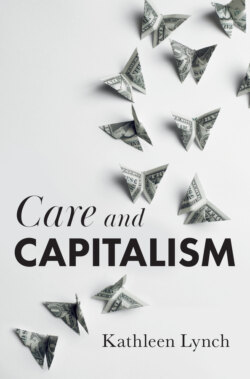Читать книгу Care and Capitalism - Kathleen Lynch - Страница 26
Affective relations of love, care and solidarity: unincorporated residuals
ОглавлениеBecause no dominant social order can erode and erase all human practice, energy, and intentions (Williams 1977), neither can neoliberal capitalism. While capitalism has commodified much of the care world, it has not been able to incorporate it completely, not least because certain forms of care relations are non-commodifiable; they are based on intentions and feelings that are voluntarily given and/or are non-substitutable (Lynch 2007; Mol 2008; Flores 2013; Cantillon and Lynch 2017).
Care relations are unincorporated residuals in Raymond Williams’ terms; they remain outside and, for the most part, in opposition to legitimated cultural and party politics. Because these relations have not been fully incorporated, they lack status as political subjects, being regarded as apolitical, private and personal family matters (Okin 1989; Kittay 1999; Held 2006). It is because they have been disregarded, unaligned and unincorporated that affective care relations matter as potential sites of resistance. They are waiting to be articulated politically, to be mobilized and organized, as the co-creation and nurturing of relational life are dependent on them. Affective justice is an everyday concern for many, many millions of people owing to the care crises of the twenty-first century (Fraser 2016; Dowling 2021).
While the power of capitalism to reinvent itself and incorporate resistance is ubiquitous (Boltanski and Chiapello 2005), and seemingly overwhelming (Streeck 2016), meaning-making does not take place solely within markets. People live extensive lives outside the capitalist economy where non-market meaning and values are also materially created, especially through caring. There is scope for developing alternative thinking, new paradigms of justice and social action built around affective relations (Gibson-Graham 1996). If we put capital–labour relations at the centre of all meaning-making (Gibson-Graham, Cameron and Healy 2016: 194), we undermine our capacity to think outside that framework.
